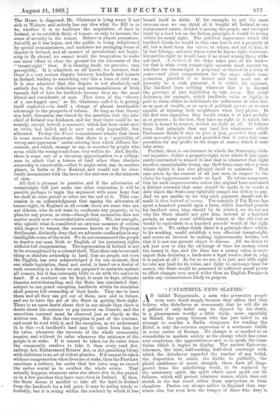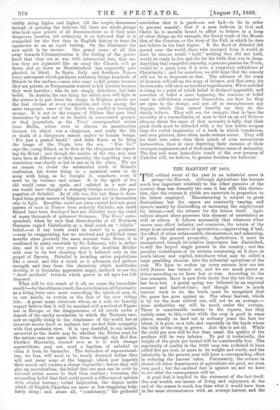" UNFAITHFUL UNTO SLAYING."
AN infidel Torquemada, a man who persecutes people even unto death simply because they affirm that they believe, who disbelieves so strenuously that he will die on a gallows if only belief may be injured by his death, is a phenomenon worthy a little study, more especially as Biland, the young German who has just failed in an attempt to murder a Berlin clergyman for reading the Belief, is only the extreme expression of a sentiment visible in every corner of Europe. No change is so marked or so remarkable in modern society as the change which has come over scepticism, the aggressiveness and, so to speak, the fana- ticism which it begins to display. The ancient Epicurean tolerance, the faint, half-smiling, half-sleek contempt with which the disbeliever regarded the teacher of any belief, the disposition to satire, the dislike to publicity, the placid confidence of secret strength, these have all disap- peared from the unbelieving world, to be replaced by the missionary spirit, the spirit which must speak out its fullness, which will protest whatever comes, which does not shrink in the last resort either from martyrdom or from slaughter. Parties are always milder in England than any- where else, but even here the temper of those who deny is
visibly rising higher and higher, till the sceptic denounces instead of quizzing the believer, till there are whole groups who look upon priests of all denominations as if they were dangerous lunatics, till orthodoxy is so battered that it is compelled for the first time in English history to treat its opponents as on an equal footing. On the Continent the
new spirit is far sterner. One grand cause of all this sway towards Ultramontanism is the feeling of the priest- hood that they are at war with internecine foes, that un- less they are organized like an army the Church will go down, and go down as Montalembert has repeatedly pro- phesied, in blood. In Spain, Italy, and Southern France every movement which paralyzes authority brings hundreds of Bilands to the surface,—men who want to kill priests because they are priests, as Torquemada wanted to kill heretics because they were heretics ; who do not simply disbelieve, but hate belief. In Austria the one thing for which men will fight in the streets is to put down the clergy, in Belgium priests are the first victims of every commotion, and even among the more temperate races of the North the conflict is becoming savage. It is not in the temper of Gibbon that men bind themselves by oath not to be buried in consecrated ground, or that journalists, as the Times' correspondent writes from Berlin, refuse even to discuss an assassination because its object was a clergyman, and really the life or death of a clergyman cannot matter to human beings. " It's just a pented bredd," said John Knox, as he flung the image of the Virgin into the sea. " You lie !" says the young Biland, as he fires at the clergyman for repeat- ing his Belief ; and though the motive of the two acts may have been as different as their morality, the impelling fury of conviction was clearly as hot in one as in the other. We see no reason to doubt the substantial truth of Biland's confession, his desire rising to a maniacal crave to do away with lying, as he thought it, somehow, even if need be by violence and crime. It is the spirit of the old world come up again, and enlisted in a new and one would have thought a strangely foreign service, the pro- pagation of disbelief. As of old, too, this hot flame is deve- loped from great masses of fuliginous matter not in themselves easy to light. Ravaillac could not have existed had not great masses of men in France been ardently Catholic, nor could Biland have been developed had not disbelief been the creed of many thousands of quiescent Germans. The Times' corre- spondent, when he says that three-fourths of all Northern Germans regard Christianity as a dead creed, an " Asiatic " belief,—as if any truth could be tested by a quadrant, —may be exaggerating, but we received and published some months since precisely the same account from Hesse, it is confirmed in many essentials by Dr. Lehmann, who is ortho- dox, and it is not two years since the Austrian Reichs- rath rose to its feet shouting that it believed only in the gospel of Darwin. Disbelief is invading entire populations like a creed, and like a creed, as it advances, and gathers strength and fury from the electricity which multitudes develop, it is becoming aggressive, angry, inclined to use the " short methods" towards which power in all ages has felt disposed.
What will be the result of it all, we mean the immediate result?—for the ultimate result, the revivification of Christianity as a living force once more controlling the minds of men, is, to our minds, as certain as the flow of the now ebbing tide. A great many observers whom, as a rule, we heartily respect believe that it will be unmixed evil, a revival of Pagan- ism in Europe, or the disappearance of all creeds under a deposit of the earthy secularism to which the Teutonic race, now 'so rapidly rising to the dominance of the world, has at intervals shown itself so inclined, but we feel little sympathy with that pessimist view. It is very doubtful, to our minds, sorrowful as the doubt may be, whether the Divine road for the nations may not again take them through the Red Sea, whether Humanity, crusted over as it is with strange superstitions, may not need a baptism of unbelief to clean it from its barnacles. The defenders of supernatural- ism, we fear, will need to be nearly drowned before they will cast away some of the baggage which now impedes their march and renders a charge impossible ; before they will give up sacerdotalism, the belief that one man can be made by external action nearer to God than another ; terrorism, the astounding belief that God could punish a difference of opinion with eternal torture ; verbal inspiration, the dogma under which all English Churches are more or less staggering help- lessly along ; and, above all, " consistency," the profound conviction that it is good—or not bad—to lie in order to prevent scandal ; that if a man believes in God and Christ he is morally bound to affect to believe in a heap of other things, as, for example, the literal truth of the Mosaic idea of the Creation, or the story of the Fall, in which he does- not believe in the least degree. If the flood of disbelief did spread over the world, those who emerged from it would at. least be sincere, would " hold " nothing they did not hold, would be ready to live and die for the faith that was in them. Anything that compelled sincerity, a genuine passion for Truth, would be a good, even if it were a temporary subsidence of Christianity ; and for ourselves, we still hope that the remedy will not be so desperate as that. The advance of the army of invasion will call up the army of defence, and that army, for its own sake, will carry no needless impedimenta. When unbelief is rising to a point at which belief is declared impossible, and assertion of belief a mere hypocrisy, the teachers of belief must in self-defence examine themselves, see how far they are open to the charge, and put off as encumbrances any dogmas which they cannot heartily say they do dis- tinctly believe. They will see, for example, that to base the- necessity of a reconciliation of man to God on an old Hebrew allegory about the cause of that necessity is folly, that their- great truth must be defended with a far less brittle weapon than the verbal inspiration of a book in which translators, and even printers, have often made serious errors. They will for their own sakes clear their minds of even unconscious insincerities, thus at once depriving their enemies of their strongest arguments and of their most bitter cause of animosity. The first and most immediate result of the new tyranny oU Unbelief will, we believe, be greater freedom for believers.































 Previous page
Previous page